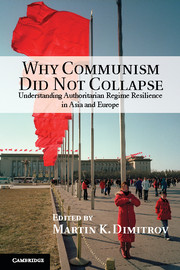
-
Select format
-
- Publisher:
- Cambridge University Press
- Publication date:
- August 2013
- July 2013
- ISBN:
- 9781139565028
- 9781107035539
- 9781107651135
- Dimensions:
- (228 x 152 mm)
- Weight & Pages:
- 0.7kg, 390 Pages
- Dimensions:
- (228 x 152 mm)
- Weight & Pages:
- 0.57kg, 390 Pages
You may already have access via personal or institutional login
Book description
This volume brings together a distinguished group of scholars working to address the puzzling durability of communist autocracies in Eastern Europe and Asia, which are the longest-lasting type of non-democratic regime to emerge after World War I. The volume conceptualizes the communist universe as consisting of the ten regimes in Eastern Europe and Mongolia that eventually collapsed in 1989–91, and the five regimes that survived the fall of the Berlin Wall: China, Vietnam, Laos, North Korea and Cuba. The essays offer a theoretical argument that emphasizes the importance of institutional adaptations as a foundation of communist resilience. In particular, the contributors focus on four adaptations: of the economy, of ideology, of the mechanisms for inclusion of potential rivals, and of the institutions of vertical and horizontal accountability. The volume argues that when regimes are no longer able to implement adaptive change, contingent leadership choices and contagion dynamics make collapse more likely.
Reviews
“Is the difference smarter leaders? Luckier circumstances? Deeper ideological beliefs? Structural flaws or assets? Political strategies of limited opening versus inopportune repression? Differential impact of the international system? This splendid team of authors thoughtfully sheds comparative light on the opaque processes of the collapse or survival of communist regimes.” – Jorge I. Domínguez, Harvard University
“This is a terrific book. By using paired comparisons of communist regimes that collapsed in 1989–1991 and others that managed to survive, Dimitrov and his fellow authors provoke us to think in new ways about the durability of these types of regimes over time. In this way, the volume moves us beyond clichéd discussions about the trials of communism and challenges us to think systematically about what determines regime resilience and failure. I have no doubt that this book will provide important insights for future studies about the entire communist era.” – A. James McAdams, University of Notre Dame
“Communism has a past, but does it have a future? In this fascinating study, Martin Dimitrov has assembled an impressive set of leading international scholars to examine the staying power of the communist party-states that weathered the 1989–1991 denouement of the Soviet Union and its client states. The result is a theoretically insightful and empirically rich study in comparative politics and Leninist style systems. The volume leaves the reader with the sense that we have not seen the end of collapsing communist-type regimes.” – David Shambaugh, The George Washington University and The Brookings Institution
Contents
Metrics
Altmetric attention score
Full text views
Full text views help Loading metrics...
Loading metrics...
* Views captured on Cambridge Core between #date#. This data will be updated every 24 hours.
Usage data cannot currently be displayed.
Accessibility standard: Unknown
Why this information is here
This section outlines the accessibility features of this content - including support for screen readers, full keyboard navigation and high-contrast display options. This may not be relevant for you.
Accessibility Information
Accessibility compliance for the PDF of this book is currently unknown and may be updated in the future.


